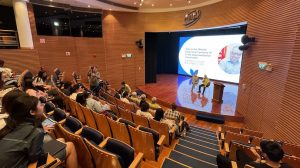The Institute recently hosted Prof. Iis Tussyadiah for a discussion on the role of artificial intelligence in the development of the tourism and hospitality industry. The University of Surrey expert emphasised the technology’s potential for use in decision-making tasks, but noted potential risks had to be weighed
Prof. Iis Tussyadiah from the University of Surrey, in the United Kingdom, led at IFTM a seminar on the transformative influence of artificial intelligence (AI) in the tourism and hospitality industry. The topic attracted an audience of approximately 50 people, including master’s and PhD students.
Prof. Tussyadiah is an expert on intelligence systems and digital transformation within the services sector, focusing on human-computer interaction, consumer behaviour, and management.
The seminar was held in the Auditorium at the Taipa Campus, on 12 December. Themed “How to AI in Tourism and Hospitality”, it covered various facets of AI implementation in the industry. Prof. Tussyadiah shared her expertise on topics such as generative AI – capable of generating fresh content such as text, images, or other media – and digital nudging, i.e., using design, information, and interaction elements to guide user behaviour in digital environments. She also discussed the advantages and challenges associated with integrating AI in the dynamic fields of hospitality and tourism.
Throughout the seminar, Prof. Tussyadiah underscored the usefulness of AI in assisting managerial-level decision-making, particularly in relation to data analysis and presenting ‘decision options’ based on such analysis. She also explored AI’s importance in advancing sustainable tourism, in terms of addressing economic, social, and environmental impacts.
The scholar highlighted that AI had an increasing role in daily life, with benefits for consumers and service providers. One positive was AI as a tool to support workplace productivity.
She also mentioned some inherent risks of AI: that included applications related to monitoring employees; and data privacy concerns tied to the use of AI in places frequented by the public, such as airports and shops.
As Head of the School of Hospitality and Tourism Management at the University of Surrey, Prof. Tussyadiah brings a wealth of experience to her work. Her past roles include a stint as President of the International Federation for Information Technologies and Travel & Tourism (IFITT), as well as being a founding member of the Alliance for Innovators and Researchers in Tourism and Hospitality (AIRTH).
The seminar saw students actively engaging with the speaker.
Earlier this year, IFTM established a partnership with the University of Surrey, paving way for the introduction of a dual master’s degree programme. It enables postgraduate students pursuing a master’s degree at IFTM to complete a portion of their studies at the U.K. institution. Upon successfully finishing the 2-year dual master’s programme, participants are entitled to a master’s degree certificate from IFTM and one from the University of Surrey.









